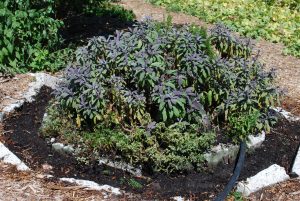Autumn Capstone Symposium – environmental education, carbon footprint, permaculture and more!
The Environmental Studies Winter Capstone Symposium is coming up on Monday, December 5. The event showcases the results from a three quarter long course series that encompasses an internship with partner organizations at UW and across Seattle.
All are welcome to join for the students’ oral and poster presentations. Topics range from empowering youth through education, to improving Seattle’s greenways, to curbing climate change and promoting permaculture in urban farming practices.
Here’s a sneak preview of a few of the internship projects students worked on this past Summer.
Session A covers environmental education: nurturing young minds in nature.
Environmental Studies student Jamie Kisela worked with the WILD (Wilderness Inner-City Leadership Development) youth program to explore effective curriculum design that can best facilitate environmental learning and empower students. WILD welcomes ninth through twelfth grade students to build leadership and team-building skills within the context of environmental education, civic involvement and intergenerational relationship building.
As part of her internship, Jamie worked with WILD to explore the value of experiential education and identify ways to engage youth in stewarding the environment within low-income and communities of color. This summer, WILD hosted a celebration and community meal in Seattle’s Danny Woo Community Garden to share memorable moments from the program. Many students found a week-long camping trip was the most valuable field experience contributing to their learning about the environment and each other.
- Jamie Kisela shares her experience with WILD
- Jamie with her site supervisor (and PoE alum) Ryan Cun.
- WILD community gathering.
Session B covers policy and planning to preserve the planet.
Jordan Hoy wanted to explore and gain experience in sustainable urban planning and the built environment. He worked with Seattle Neighborhood Greenways to create content for community outreach and social media. Seattle Neighborhood Greenways is a safe street advocacy organization that plans and advocates for safe, equitable and comfortable streets.
As part of his internship, Jordan worked with a user-experience designer and two other Environmental Studies interns to perform user experience audits of Seattle’s neighborhood greenway network, to evaluate the bikeability+walkability through the lens of All Ages & Abilities criteria. Jordan also worked on a video series funded by SDOT that highlights how street infrastructure improvements benefit local businesses. Check out his latest video.
Session C covers sustainability in business and academia.
How does an institution like UW reduce its air travel? Tessa Yip and Andrew Tran worked with UW Sustainability to find out. UW Sustainability supports a variety of campus sustainability initiatives, including recycling and energy efficiency. Last year, UW worked with a graduate team to collect data on UW’s air travel emissions and conducted interviews of faculty and staff, providing recommendations moving forward.
Tessa continued this work to aid UW Sustainability and the travel office to better track air travel and make emissions data more reliable and quicker to gauge. This included conducting usability tests and exploring the ethics of air travel. Passionate about both travel and mitigating climate change, this project allowed Tessa to investigate potential avenues to reduce UW’s carbon footprint. Andrew focused his internship on alternatives to air travel and feasible workarounds to reduce work related trips, and help contribute ideas for UW to work toward its Climate Action Plan goals of achieving carbon neutrality by 2050.
Tessa and Andrew recently presented their findings at a UW Travel Information Meeting.
Session D is the poster session and covers a range of topics.
Tessarae Mercer worked with UW Farm to expand and improve on the existing permaculture garden as part of her capstone. The UW Farm is a 1-acre, student-powered urban vegetable farm located on three sites at the University of Washington Seattle campus. The farm’s mission is to serve as the space on campus to study urban agriculture and sustainability. The farm’s permaculture garden demonstrates to students, workers and volunteers the potential for holistic approaches to growing food.
Tessarae’s internship included pruning, managing the growth of weeds, and conducting research on the environmental benefits of permaculture as well as the barriers to integrating permaculture into current systems of farming. She found education was one barrier, and worked to create signage and a handbook to address this challenge. Tessarae intends on pursuing a career related to sustainable food systems after she graduates.
- Tessarae fixed up this herb spiral, weeding, pruning, composting and all.
- The UW Farm.
- Showing off the comfrey, a nutrient-rich plant that flourishes on its own.
View the full Capstone Symposium schedule. The symposium will take place from 1:30pm-5:30pm at Alder Hall on Monday, December 5. Refreshments provided.





